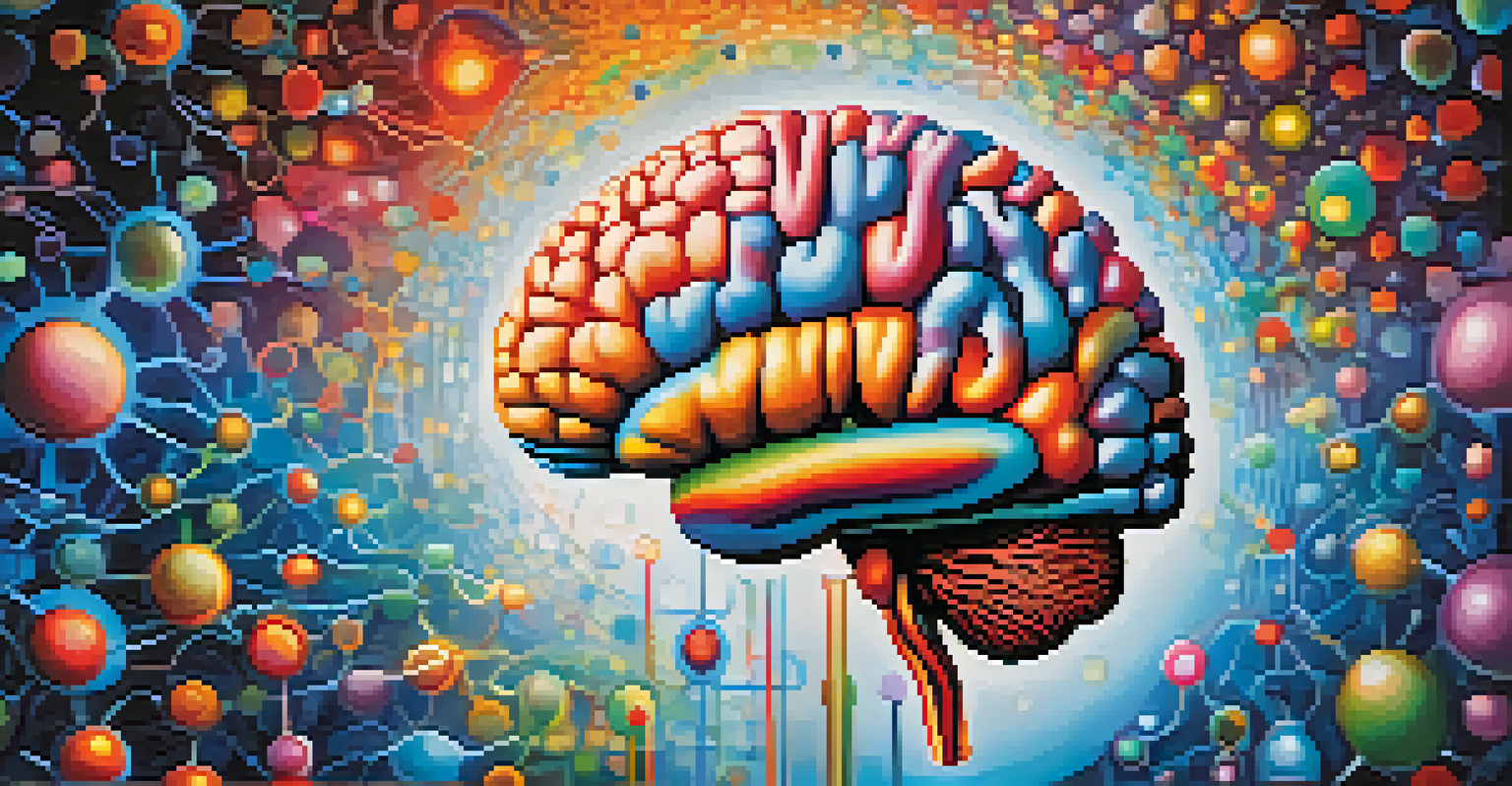Exploring Psilocybin: Current Clinical Trials and Findings

Understanding Psilocybin and Its Historical Context
Psilocybin, a naturally occurring psychedelic compound, has roots that trace back thousands of years, primarily used by indigenous cultures in spiritual rituals. It comes from specific species of mushrooms, often referred to as 'magic mushrooms.' Recently, there's been a resurgence of interest in psilocybin, not just for its mystical properties but for its potential therapeutic benefits.
Psychedelics are a tool for the mind that can help people uncover the roots of their suffering and find healing in a way that traditional therapies often cannot.
Historically, psychedelics were often dismissed or stigmatized due to their association with counterculture movements. However, as scientific research has advanced, psilocybin is now being viewed through a different lens—one that considers its potential to treat various mental health issues like depression and anxiety. This shift in perspective is fostering a new wave of clinical trials aimed at understanding its efficacy.
Today, researchers are eager to explore how psilocybin can be integrated into modern medicine. With promising initial findings, the conversation around this compound is evolving, moving from taboo to treatment, which is a remarkable journey for something once relegated to the fringes of society.
Current Clinical Trials: An Overview
Numerous clinical trials are currently underway to investigate the effects of psilocybin on various mental health conditions. These trials are examining its potential benefits for individuals suffering from treatment-resistant depression, PTSD, and substance use disorders. The goal is to provide a scientifically validated understanding of how psilocybin can be used as a therapeutic tool.

One notable trial is being conducted at Johns Hopkins University, where researchers are exploring psilocybin's effects on cancer-related anxiety and depression. Participants are given a controlled dose of psilocybin in a supportive setting, allowing them to process their emotions and experiences deeply. Early results suggest significant reductions in anxiety and improvements in overall well-being.
Psilocybin's Historical Use
Psilocybin has a rich history rooted in indigenous cultures, primarily used in spiritual rituals, which is now being explored for its therapeutic benefits.
The rigorous nature of these trials, combined with ethical oversight, aims to ensure safety and efficacy. As findings emerge, they contribute to a growing body of evidence supporting psilocybin's role in mental health treatment, paving the way for its potential approval in clinical settings.
Promising Findings: Mental Health Benefits of Psilocybin
Research has shown that psilocybin may induce profound changes in mood and consciousness, leading to significant improvements in mental health. Many participants in clinical trials report experiences of enhanced emotional clarity and a sense of connection, which can be transformative. This suggests that psilocybin may help address underlying issues in mental health disorders.
The therapeutic potential of psychedelics is more than a passing trend; it represents a fundamental shift in how we understand mental health and treatment.
A key finding from various studies indicates that even a single dose of psilocybin can lead to lasting positive changes in mood and behavior. For instance, a study published in 'JAMA Psychiatry' reported that patients with major depressive disorder experienced significant reductions in symptoms up to six months post-treatment. This long-lasting effect is what intrigues researchers and clinicians alike.
Furthermore, the therapeutic effects of psilocybin appear to be enhanced when combined with psychotherapy. The supportive environment provided during sessions allows individuals to confront their fears and traumas more effectively. As we gather more data, the potential for psilocybin to revolutionize mental health care becomes increasingly clear.
The Mechanism of Action: How Psilocybin Works
Psilocybin is converted in the body to psilocin, which interacts with serotonin receptors in the brain. This interaction is believed to play a crucial role in the changes in perception and mood that users experience. By affecting the brain's serotonin system, psilocybin can alter the way individuals process emotions and thoughts.
Studies have shown that psilocybin can disrupt default mode network (DMN) activity, a brain network associated with self-referential thoughts and mind-wandering. This disruption may lead to a sense of ego dissolution, allowing individuals to step outside of their habitual thought patterns. This is particularly beneficial for those grappling with depression or anxiety, as it offers a fresh perspective on their circumstances.
Clinical Trials Show Promise
Current clinical trials are investigating psilocybin's effectiveness in treating mental health conditions such as depression and PTSD, with encouraging early results.
As researchers delve deeper into the neurobiology of psilocybin, they are beginning to uncover the complex interplay between the compound and brain function. Understanding these mechanisms will be crucial not only for developing effective treatments but also for ensuring safety and minimizing risks associated with psychedelic therapy.
Safety and Risks: What to Consider
While psilocybin shows promise, it's essential to consider the safety and potential risks associated with its use. Clinical trials are conducted under strict medical supervision to minimize risks, but psilocybin can still lead to challenging psychological experiences, sometimes referred to as 'bad trips.' These experiences can be distressing, especially for individuals with a history of mental health issues.
Moreover, setting plays a crucial role in the psilocybin experience. A supportive and controlled environment can significantly affect outcomes, making it important for those considering this treatment to engage with trained professionals. This ensures that participants have the necessary support before, during, and after their experiences.
As research progresses, understanding the balance between benefits and risks will be vital. While psilocybin has shown therapeutic potential, ongoing studies will help delineate the safest ways to incorporate it into treatment regimens.
Ethical Considerations in Psilocybin Research
As psilocybin research expands, ethical considerations are increasingly coming to the forefront. The history of psychedelics has been fraught with controversy, and ensuring that research is conducted responsibly is paramount. Researchers must navigate issues such as informed consent, participant safety, and the potential for misuse.
Additionally, there’s a growing conversation around accessibility and equity in psilocybin therapy. As these treatments become more mainstream, it’s essential to consider who will have access to them. Ensuring that marginalized communities can benefit from these advancements is an ethical imperative that needs to be addressed as the field evolves.
Ethical Considerations Are Key
As psilocybin research expands, addressing ethical concerns like informed consent and accessibility is crucial for responsible integration into medical practice.
By prioritizing ethical standards, researchers can foster a more responsible approach to psilocybin research. This not only protects participants but also helps build public trust in the scientific process, which is crucial for the acceptance of psychedelic therapies in broader medical practice.
The Future of Psilocybin in Medicine
The future of psilocybin in medicine looks promising, with ongoing research poised to reshape how we approach mental health treatment. As the stigma surrounding psychedelics continues to diminish, more healthcare professionals are open to integrating psilocybin into therapeutic practices. This shift could lead to a new era in mental health care, providing alternative options for those who have not responded to traditional treatments.
Moreover, as more clinical trials yield positive results, there is potential for psilocybin to receive regulatory approval. This would allow for its use beyond research settings, making it accessible to those in need. However, it will be crucial to establish guidelines and training for practitioners to ensure safe and effective use.

In summary, the exploration of psilocybin is not just about understanding a compound but about unlocking new pathways to healing. With a commitment to research, ethical practices, and patient care, the future could see psilocybin as a valuable tool in the mental health toolkit.